Examining the biblical account of Nehemiah rebuilding the walls of Jerusalem, Lovett H. Weems Jr. sees a compelling example of how a leader should function. Nehemiah defined the reality of the situation, named a vision, and then engaged the people to accomplish it.
To celebrate the Lewis Center’s anniversary, we are highlighting Leading Articles — some of our most popular posts of the past 20 years. We are pleased to share again this article by Lovett H. Weems Jr. originally published on February 8, 2017.
The prophet Nehemiah provides modern day leaders a wonderful model of leadership. Upon learning of the distress of his people, Nehemiah receives permission from the king he was serving to go help them. Despite obstacles and opposition, he discerns a challenging vision and leads the people in accomplishing it.
While Nehemiah was the leader who first articulated the vision, the people confirmed the vision and committed themselves to the task. The gifts of all were required to achieve the vision. Accomplishing the vision was not easy. Divisions and hard feelings, combined with outside opposition, made faithfulness very difficult. Yet, Nehemiah and the people persevered faithfully, though not perfectly. Below are some lessons we might learn from Nehemiah’s leadership example.
1. God’s leader responds to a call.
God has always called leaders. Leaders must hear God’s calling to lead and respond to that call. Nehemiah understands his leadership as a calling from God (Nehemiah 2:12b). Nehemiah listened and came to see the need (1:1-4).
2. God’s leader cares for the people and their situation.
Nehemiah listened to the voice of the people. He showed care for their situation. Nehemiah identified with the people. He thought in terms of “we” and “us” (2:17, 20). He came to understand and identify with “the trouble we are in” (2:17).
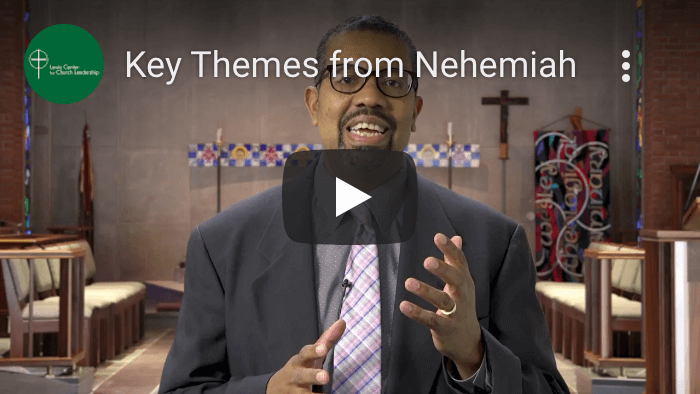

3. God’s leader helps define the reality of the situation.
When Nehemiah said, “You see the trouble we are in, how Jerusalem lies in ruins with its gates burned,” he was not describing his personal agenda but assessing the common situation faced by all the people. Unless the reality can be described honestly, progress is impossible. “Nothing is more limiting to a group,” says Peter Senge, “than the inability to talk about the truth.”
4. God’s direction and vision are sought by the leader and people.
Nehemiah was always asking God to provide a vision for him. He understood that a true vision must come from God. It must be a God-inspired and God-revealed vision. Only such a vision is worthy of leadership. The vision must be “what God has put into my heart” (2:12). The vision emerged in the midst of a devastating situation. It would have been easier to give up in despair, but God’s leader always seeks God’s vision, even in difficult times.
5. Prayer is essential to know God’s will.
Prayer is the fundamental act for people of God. God’s leaders and God’s people must be in the right place to hear God’s voice. God can speak to us at any time, but if we are not turning our hearts toward God to seek God’s guidance, it is more difficult for God’s vision to reach our hearts. The prophet Habakkuk climbed into the tower believing that God had a vision for him and his people. Habakkuk was willing to wait for the vision, but knew that he needed to put himself in a position to receive it.
“Leading Like Nehemiah,” a Leading Ideas Talks podcast
episode featuring Lovett H. Weems Jr.
Listen now or read interview.
6. God’s vision is simple.
God’s vision tends to be very simple. People build complicated systems, but God’s will is often extremely simple. For Nehemiah and his people the vision was captured in three words: “rebuild the wall.” There were many needs, hopes, and dreams of the people, but God’s vision for the immediate future was captured in rebuilding the wall. Without this vision, the other needs could not be met.
7. God’s leader builds a team.
Nehemiah gained the trust of the people. This permitted him to build a team that could make the vision happen. People shared responsibility to accomplish the goal. No one person, not even Nehemiah, could accomplish this vision alone. Nehemiah began with a few, then he expanded the team to include virtually everyone. The people committed themselves to the “common good” (2:18b). The talents of the people were named and used (chapter 3). Different people worked on different sections of the wall. People were assigned to work closest to their homes.
But even God’s people get tired. They felt the task was taking too much time and was too difficult. There were internal disputes. Someone has said, “Everything looks like failure in the middle.” But Nehemiah was able to find ways to alleviate their concerns without losing the vision.
8. God’s leader keeps the real purpose before the people.
It is easy for people to forget the purpose behind the vision even as they work to fulfill it. The vision was to rebuild the wall, but the wall was not the important part of the vision. The wall was a means to a larger purpose. What Nehemiah and his people were really about was reclaiming their identity as people of faith. What was at stake was not just a wall but indeed their very faith (Chapter 8; 12:27). Nehemiah had to make sure the people were reminded of their ancient faith. Because their task was tied to a larger purpose, they put their hearts into their work and were able to complete the task in 52 days (6:15-16). What an amazing feat this was.
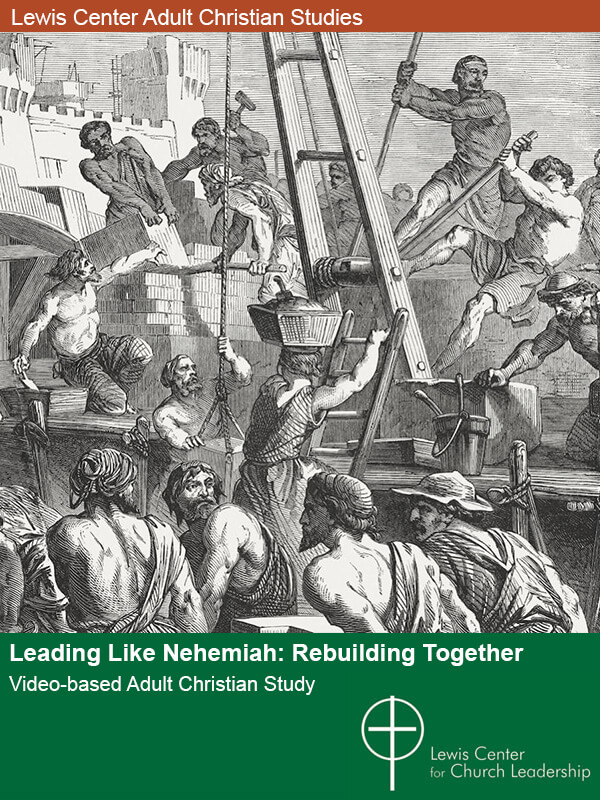
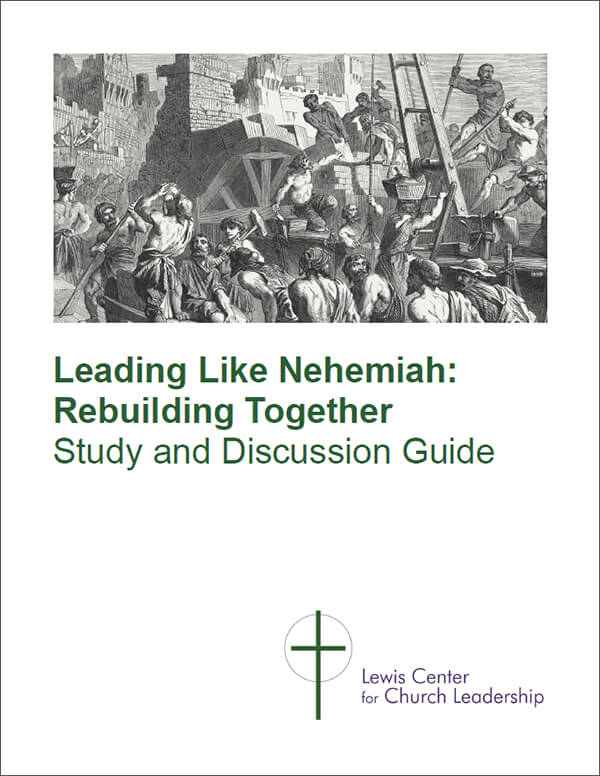
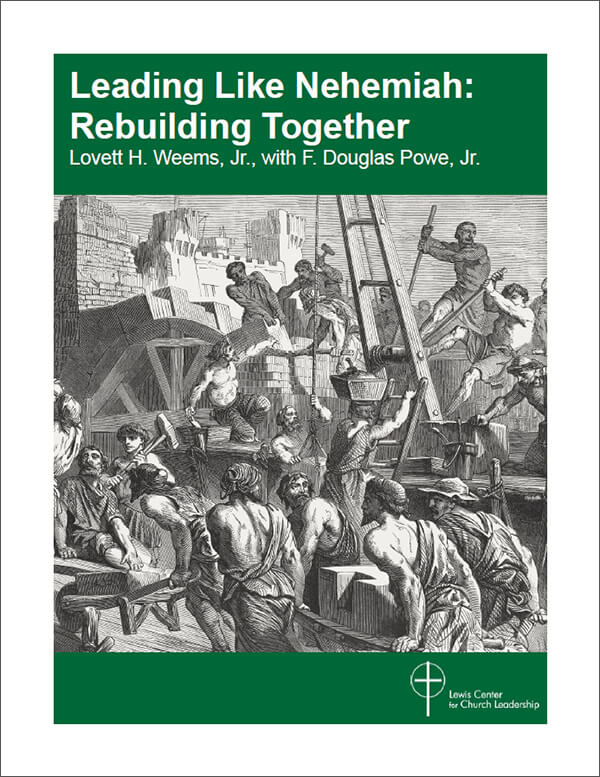 The Leading Like Nehemiah: Rebuilding Together video-based adult Christian study curriculum includes video lessons, Study and Discussion Guide, and Leading Like Nehemiah: Rebuilding Together e-book. This study ideal for your congregation’s online and in-person small groups, adult Bible studies, and Sunday School classes. Learn more now.
The Leading Like Nehemiah: Rebuilding Together video-based adult Christian study curriculum includes video lessons, Study and Discussion Guide, and Leading Like Nehemiah: Rebuilding Together e-book. This study ideal for your congregation’s online and in-person small groups, adult Bible studies, and Sunday School classes. Learn more now.
9. God’s leader is not discouraged by adversity.
As they rebuilt the wall, they were ridiculed and mocked. Their enemies did everything possible to discourage them. They threatened to tell untrue stories about Nehemiah. Nehemiah listened but persisted. Nehemiah knew he was “doing a great work” (6:3) and could not come down from the wall to debate with the enemies. Nehemiah persisted even when adversity came. God’s people cannot give up when adversity comes.
Want more articles like this? Subscribe free to Leading Ideas e-newsletter for information, resources, and strategies for forward-thinking church leaders like you — delivered straight to your inbox every Wednesday.
10. God always has another vision.
When people work so hard to accomplish a great goal, the temptation is to want to stop and rest. God’s people should stop and celebrate victories, just as Nehemiah and his people did; but God is never finished with us. After we give thanks to God for bringing us to a new place on our journey, then we must turn again to God in prayer asking, “What, now, is your will for us?” It is time for revisioning.
We are always on a journey with God. We rest for a brief time, but we do not stop. We keep seeking the new land that God is calling us to reach. God always has something else for us to do. We cannot become what God wants us to be by remaining what we are.
Related Resources:
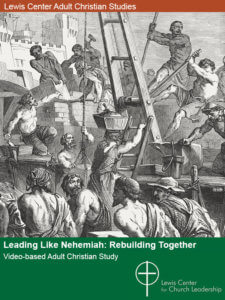 Leading Like Nehemiah: Rebuilding Together, video-based adult study curriculum from the Lewis Center
Leading Like Nehemiah: Rebuilding Together, video-based adult study curriculum from the Lewis Center- Discovering God’s Future for Your Church, a Lewis Center video tool kit resource for congregational visioning
- Leading Like Nehemiah featuring Lovett H. Weems Jr. — Leading Ideas Talks podcast episode | In-depth interview
- Church Leadership: Vision, Team, Culture, Integrity, Revised Edition by Lovett H. Weems Jr.
- Jesus as Transformational Leader by Natasha LeShawn Gadson







